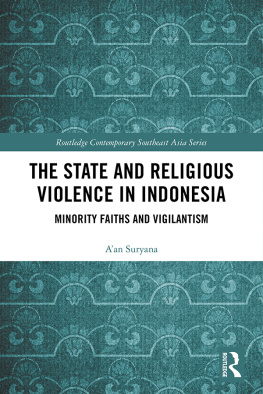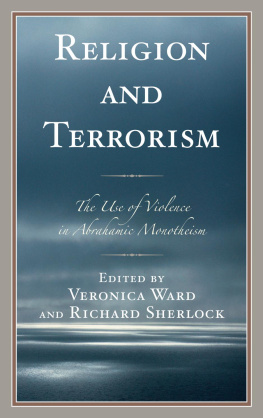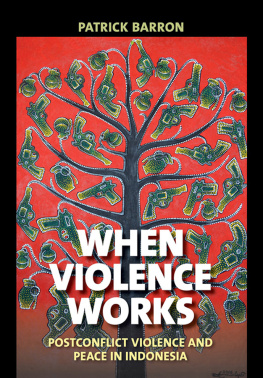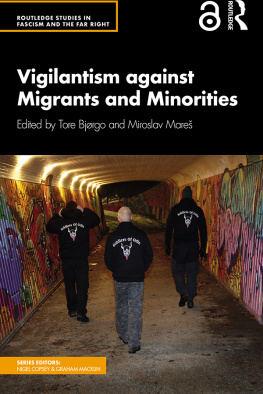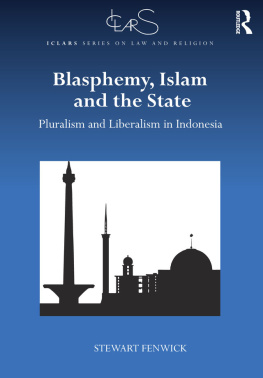The State and Religious Violence in Indonesia
This book analyses the response of the Indonesian state to violence against Ahmadiyah and Shia minority communities by foregrounding the close connections between state officials and vigilante groups, which influenced the way the post-Soeharto democratic Indonesian governments addressed the problem of violence against religious minorities.
Arguing that the violence stemmed in part from the state officials close connection with vigilante groups, and a general tendency for the authorities to forge mutual and material interests with such groups, the author demonstrates that vigilante groups were able to perpetrate violence against the minority congregations with a significant degree of impunity. While the Indonesian state has become far more democratic, accountable, and decentralized since 1998, the violence against Ahmadiyah and Shia communities shows a state that is still unwilling in assisting or allowing minority groups to practice their religion. The research undertaken for this book draws upon a lengthy period of ethnographic fieldwork in the communities of West Java and East Java. Research material includes in-depth interviews with community and religious leaders, state officials and security forces, and other prominent politicians.
A novel approach to the problem of Islam, violence, and the state in Indonesia, the book will be of interest to researchers studying Southeast Asian Politics, Islam and Politics, Conflict Resolution, State and Violence, and Terrorism and Political Violence.
Aan Suryana is a lecturer at the School of Government and Public Policy (SGPP), Indonesia.
Routledge Contemporary Southeast Asia Series
The aim of this series is to publish original, high-quality work by both new and established scholars on all aspects of Southeast Asia.
Religious Actors and Conflict Transformation in South East Asia
Indonesia and the Philippines
Edited by Jrgen Rlend, Christian von Lbke and Marcel M. Baumann
Power Interconnection in Southeast Asia
Anthony David Owen, Anton Finenko and Jacqueline Tao
Southeast Asia and the European Union
Non-traditional Security Crises and Cooperation, 20092016
Naila Maier-Knapp
Securitising Singapore
State Power and Global Threats Management
Syed Mohammed Adha Aljunied
The European Union and Myanmar
Interactions via ASEAN
Ludovica Marchi
The State and Religious Violence in Indonesia
Minority Faiths and Vigilantism
Aan Suryana
For more information about this series, please visit: www.routledge.com/Routledge-Contemporary-Southeast-Asia-Series/book-series/RCSEA
The State and Religious Violence in Indonesia
Minority Faiths and Vigilantism
Aan Suryana
First published 2020
by Routledge
2 Park Square, Milton Park, Abingdon, Oxon OX14 4RN
and by Routledge
52 Vanderbilt Avenue, New York, NY 10017
Routledge is an imprint of the Taylor & Francis Group, an informa business
2020 Aan Suryana
The right of Aan Suryana to be identified as author of this work has been asserted by him in accordance with sections 77 and 78 of the Copyright, Designs and Patents Act 1988.
All rights reserved. No part of this book may be reprinted or reproduced or utilized in any form or by any electronic, mechanical, or other means, now known or hereafter invented, including photocopying and recording, or in any information storage or retrieval system, without permission in writing from the publishers.
Trademark notice: Product or corporate names may be trademarks or registered trademarks, and are used only for identification and explanation without intent to infringe.
British Library Cataloguing-in-Publication Data
A catalogue record for this book is available from the British Library
Library of Congress Cataloging-in-Publication Data
A catalog record has been requested for this book
ISBN: 978-0-367-24857-4 (hbk)
ISBN: 978-0-429-28472-4 (ebk)
Typeset in Times New Roman
by Wearset Ltd, Boldon, Tyne and Wear
For my wife, Hisma Pratanti,
and my parents: Masruch bin Pasmin, and Sriatun binti Pasimin.
Thank you for having me.
Contents
Turning my dissertation into this book is not an easy task. I thank an anonymous reviewer and Routledge Editor, Dorothea Schaefter, for giving me useful feedback on how to improve the draft of this manuscript. I also thank Alexandra de Brauw for helping me with any administrative matters that are important to be completed to ensure the smooth preparation of my proposed book.
I am grateful to three anonymous reviewers of my PhD thesis, who all recommended that my dissertation be published as a book. Their endorsement boosted my spirit in doing this endeavour.
Dr Ross Tapsell, Professor Ariel Heryanto, and Associate Professor Greg Fealy did their best to assist me in meeting the standards required for the completion of a PhD thesis. I thank all of them for their guidance, advice, and caveats that they gave me during the thesis-writing process. I benefited from their world-class expertise in Indonesian studies. I thank my good friend, Associate Professor Julie Chernov-Hwang, for her continuous support and encouragement to me in pursuing my academic career.
I thank numerous people who, in their own ways, helped me finish my fieldwork in Kuningan and Sampang regencies, West Java and East Java provinces respectively in 2013. Aang Kunaefi became a good host, and I benefited from his wisdom and knowledge about the socio-history of the Ahmadiyah congregation in Manislor village, Kuningan regency. Subaidi served as my resourceful and knowledgeable informant in Sampang regency.
Two chapters in this book ( of this book in its 2018 edition (vol. 26, no. 2, pp. 147160). I thank the editors and the publishers of these two reputable journals for allowing me to use the aforementioned articles as part of this book.
I thank PT Geo Alam Teknika Indonesia for helping me provide maps to show where the religious conflicts occurred. Tempo Media Group helped me provide photographs that could boost the visual aspect of this book.
In the course of turning my dissertation into this book, I have come across people who made this journey enjoyable. I thank some top officials and senior staff at the School of Government and Public Policy (SGPP) Indonesia (Safendrri Komara Ragamustari, Ony Jamhari, and Yuni Katrin) for their friendship, encouragement, and professional support. For a similar reason, I also thank academics and staff at Swiss German University (SGU): Deborah Simorangkir, Muninggar Sri Saraswati, Ezmieralda Melissa, Loina Perangin-angin, Munir Waspada, Sharon Schumacher, and Sema Suri Titiasopha.
I am grateful to have my family who unconditionally love me and always give me support when I need it: Jepara and Pondok Kelapa extended families. Special thanks go to our parents: Masruch bin Pasmin, Sriatun binti Pasimin, Achmad Islah, and Endang Heruwati. Finally, and most importantly, I thank my wife, Hisma Pratanti, for her moral support and patience. She is always the source of my inspiration.


